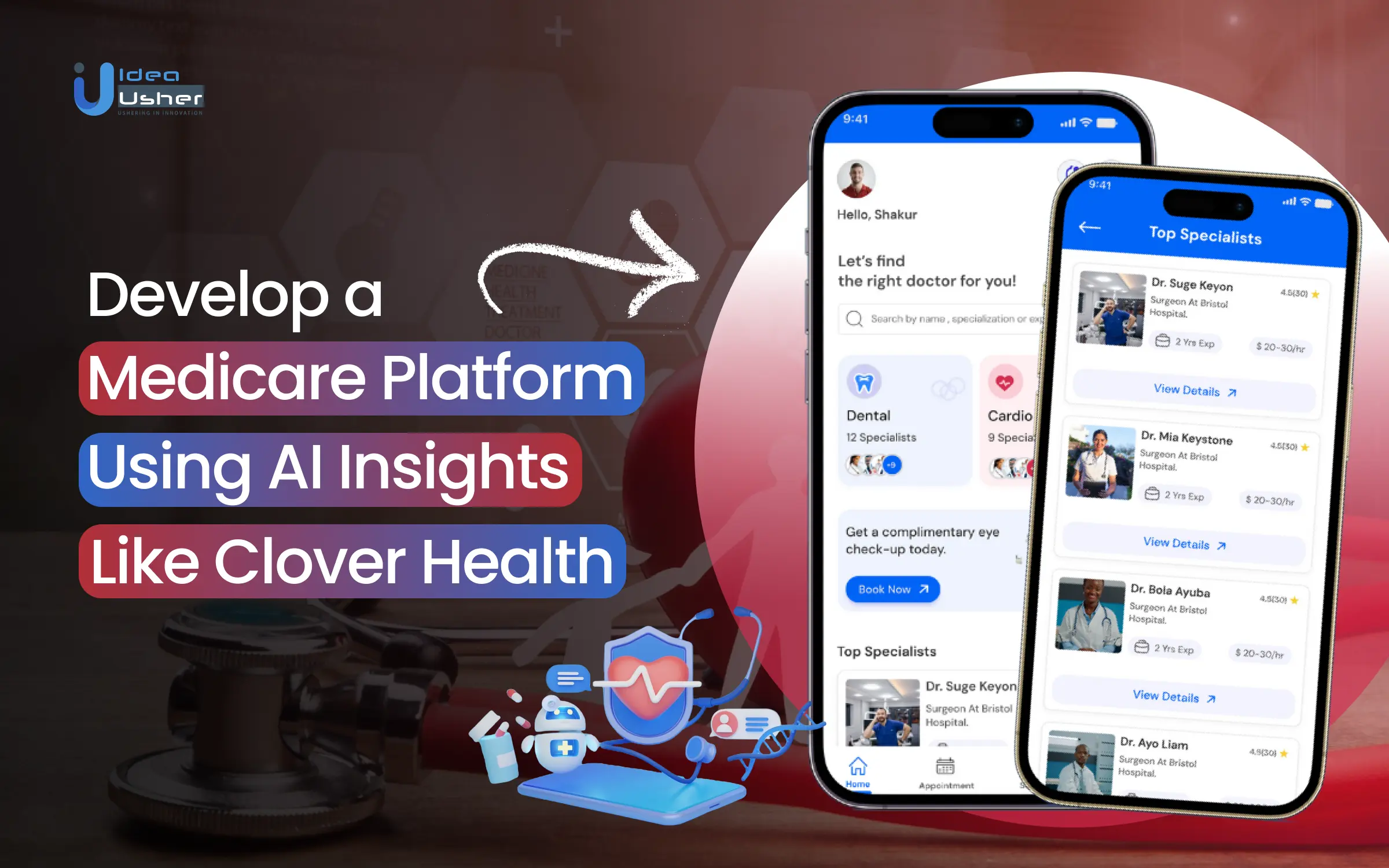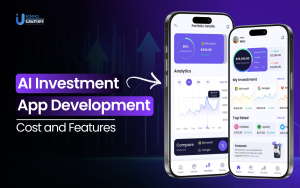Choosing the right medicare plan can feel like a daunting task, especially for seniors. With so many options and ever-changing rules, it’s easy to feel confused and overwhelmed. But medicare platforms like Clover Health, powered by AI, are making it easier to navigate this maze. These smart platforms offer personalized recommendations based on things like your age, health, and budget, helping you find the best plan for your needs. They also let you compare plans side-by-side, estimate costs, and get real-time updates on coverage and benefits. By using AI, these platforms give you the tools and support you need to make confident, informed choices about your Medicare coverage.
The global healthcare navigation platform market is growing fast, valued at USD 10.3 billion in 2023 and projected to grow at a rate of 8.4% annually through 2032. This clearly shows that more and more people are turning to these platforms to make smarter healthcare decisions. With this growing interest, there’s a big opportunity for businesses to get involved in this space. In the U.S., we’re seeing a wave of innovative Medicare platforms popping up, each offering unique ways to help people navigate their options. In this blog post, we’ll walk you through the process of creating a successful Medicare platform powered by AI insights, like Clover Health—covering everything from design and development to the must-have features that can make a real impact!
Overview of the Clover Health Platform
Clover Health is a medicare platform that aims to improve health outcomes and reduce costs for its members through innovative solutions. Founded in 2014, Clover Health primarily offers Medicare Advantage plans and works directly with the U.S. government to manage care for Medicare beneficiaries in 11 states. Their focus is on using technology to make healthcare more efficient and accessible, ultimately helping seniors lead healthier lives at lower costs.
Clover Assistant
At the heart of Clover Health is the Clover Assistant, a proprietary machine-learning platform designed to support primary care physicians. The Clover Assistant brings together patient health data and provides doctors with tailored recommendations, alerts about important medical events, and insights into a patient’s history. This helps healthcare providers make more informed decisions, improving patient care while saving time on administrative tasks.
Key Features of Clover Assistant:
- Personalized Recommendations: Clover Assistant offers customized suggestions based on individual patient data, helping doctors create personalized treatment plans and manage medications more effectively.
- Data Integration: It combines health, behavioral, and lifestyle data to identify at-risk patients, improving care coordination and ensuring more proactive care.
- Cost Reduction: By improving decision-making and care planning, Clover Assistant helps reduce unnecessary healthcare costs, particularly for those managing chronic conditions.
Key Market Takeaways for Medicare Platforms
According to GMinsights, the global healthcare navigation platform market is growing fast, valued at USD 10.3 billion in 2023, and expected to keep expanding at a rate of 8.4% annually through 2032. As healthcare becomes more complicated, patients often struggle to navigate services, making platforms that simplify access to information, appointment scheduling, and care coordination more essential than ever.
Source: GMinsights
In response to these challenges, innovative Medicare platforms are stepping up to make things easier. For example, Aprea Health recently launched Aprea Whole Health, a platform designed to help employers reduce medical costs while improving patient outcomes. It offers secure cloud-based access to health records and virtual consultations, making healthcare more accessible. Similarly, platforms like Zocdoc and HealthSparq are gaining popularity by allowing patients to book appointments and access personalized health information easily.
Strategic partnerships are also a big factor in the growth of these platforms. For instance, Aetna (a subsidiary of CVS Health) has teamed up with various healthcare providers to enhance its Medicare Advantage plans. This partnership helps Aetna expand its services and improve patient engagement with integrated digital tools, making it easier for members to access and manage their healthcare.
Work with Ex-MAANG developers to build next-gen apps schedule your consultation now
Why is a Medicare Platform AI Insights a Strong Business Investment?
A Medicare platform like Clover Health, powered by AI insights, is an excellent business investment. With over 30 million people already enrolled in Medicare Advantage plans, and that number expected to grow to 80 million by 2030, the demand for innovative healthcare solutions is soaring. As the Baby Boomer generation ages, there’s a clear need for personalized, efficient platforms to meet the unique needs of seniors.
AI can take these platforms to the next level. It enables personalized plan recommendations, automates routine tasks, and offers real-time insights into patient care. These capabilities not only enhance the user experience but also help reduce costs. For example, AI-driven Medicare platforms can cut operational costs by up to 20% and improve coding accuracy, addressing the $40 billion in improper payments that Medicare Advantage plans face due to coding errors.
Beyond cost savings, AI also boosts productivity. Agents using AI tools can double their enrollment rates, from 30-50 applications a year to 100-200. This increased efficiency leads to higher revenue and better service for seniors, making an AI-powered Medicare platform a profitable and scalable business opportunity.
Speaking of AI in healthcare….
Pharos, a Y Combinator startup, just secured $5 million in seed funding led by Felicis to apply AI to hospital quality reporting. While many healthcare startups focus on tasks like medical scribes or insurance pre-authorization, Pharos is tackling the often-overlooked job of reporting hospital quality data to external registries. By automating this process, they help hospitals improve patient care, like reducing post-surgery infections, while easing administrative burdens.
As Felix Brann, Pharos’ co-founder, puts it,
“We believe in a future where AI catches medical mistakes everywhere in the hospital, before they become serious.” Their mission is to be “the lighthouse for our hospitals,” guiding them toward safer, more efficient care.
With top investors backing this innovation, AI in healthcare is clearly on the rise. Now’s the perfect time for businesses to jump on this trend and make a real impact in the industry!
Business Model of the Clover Health Platform
Clover Health is a healthcare technology company that primarily offers Medicare Advantage plans, with a strong emphasis on leveraging advanced technology to improve care and health outcomes for its members. Founded in 2014, Clover Health uses data analytics and machine learning, particularly through its proprietary Clover Assistant, to support physicians in providing more personalized and efficient care, particularly for seniors with chronic conditions.
Core Services:
- Medicare Advantage Plans: Clover Health provides MA plans to seniors, with a strong focus on preventive care and managing chronic conditions to improve quality of life and reduce healthcare costs.
- Clover Assistant: A machine learning-based platform that helps primary care physicians by offering real-time insights and personalized recommendations, making it easier to identify undiagnosed conditions and manage existing ones more effectively.
Target Market
Clover Health serves Medicare beneficiaries in underserved areas, with a focus on 11 states, including Arizona, New Jersey, and Texas. The company aims to deliver better healthcare services to populations that may otherwise lack access to comprehensive healthcare.
Revenue Streams:
- Insurance Revenue: Clover’s primary source of revenue comes from premiums paid by members for Medicare Advantage plans. In Q3 2024, Clover Health reported $322.6 million in insurance revenue, a 7% year-over-year increase, contributing to a $1 billion total for the year.
- Non-Insurance Revenue: Clover also generated non-insurance revenue through various activities, although this has decreased in recent years. In Q4 2023, non-insurance revenue dropped to $197.9 million from $622.6 million in Q4 2022.
Financial Performance
Clover Health has shown significant progress in improving its financial metrics:
- Net Loss Reduction: The company reduced its GAAP net loss from $33.6 million in Q3 2023 to $8.8 million in Q3 2024. For the year-to-date period in 2024, the net loss decreased to $24.8 million, compared to $142.2 million in the previous year.
- Adjusted EBITDA Growth: Clover’s adjusted EBITDA increased from $2.7 million in Q3 2023 to $19.3 million in Q3 2024, demonstrating strong operational improvements.
- Medical Cost Ratio): The insurance MCR improved to 82.8% in Q3 2024, from 83.3% in Q3 2023, indicating better management of medical costs relative to premiums earned.
Operational Strategies
Several key strategies drive Clover Health’s success:
- Chronic Disease Management: Given that 85% of seniors have at least one chronic condition, Clover uses data-driven approaches to improve medication adherence and reduce unnecessary hospital visits.
- Community Engagement: Clover focuses on reaching socioeconomically disadvantaged communities, offering tailored healthcare solutions to address the specific challenges faced by these populations.
Other Popular Medicare Platforms
| Company | Platform Name | Revenue Model | 2024 Revenue Stats | Key Features |
| Bright Health Group | Bright Health Platform | Value-based care model | Revenue of $1.2 billion in 2023; projected growth of 15% in 2024 | Personalized care management, integrated health services, data analytics for improved outcomes |
| Oscar Health | Oscar Platform | Direct-to-consumer and B2B models | $1.8 billion in revenue for 2023; aiming for profitability in 2024 | AI-driven member engagement, telemedicine services, personalized health plans |
| Alignment Healthcare | Alignment Platform | Value-based care and risk-sharing | Revenue of $1.1 billion in 2023; projected to grow by 20% in 2024 | Integrated care coordination, focus on underserved populations, AI-enhanced patient insights |
Steps to Develop a Medicare Platform like Clover Health
Here are the steps to develop a medicare platform like Clover Health,
1. Research and Compliance with Healthcare Regulations
Understanding and adhering to healthcare regulations is critical. Developing a Medicare platform requires compliance with laws such as the HIPAA in the U.S. Companies must ensure that their platforms meet stringent privacy and data security standards to protect patient information. Collaboration with legal experts can help maintain compliance.
2. Establish Partnerships with Healthcare Providers and Government Agencies
Collaborating with healthcare providers and government agencies is necessary to offer Medicare services. Establish partnerships with hospitals, clinics, and physician networks to deliver quality care. Work directly with Medicare and related entities to ensure all operational aspects align with federal guidelines and requirements.
3. Build a Comprehensive Data Infrastructure
A robust data infrastructure is essential for handling large volumes of patient health records and claims data. Develop a secure and scalable system that can efficiently process, analyze, and store health information. This infrastructure should integrate with EHRs and other healthcare databases to access and share data seamlessly.
4. Develop a Machine Learning and Analytics Platform
Create a platform similar to Clover Assistant, focusing on machine learning and predictive analytics. This system should assist healthcare providers by delivering tailored insights, highlighting patient risk factors, and offering evidence-based recommendations. Using advanced algorithms can help improve patient outcomes and streamline clinical decision-making.
5. Design an Intuitive User Interface for Healthcare Providers
Develop a user-friendly interface for doctors and healthcare providers. The interface should display critical patient data, offer actionable insights, and reduce administrative workloads. Clear navigation, easy-to-read charts, and customizable features can make the platform effective and efficient for users.
6. Integrate Health Monitoring and Alert Systems
Include systems that can monitor patient health data and provide timely alerts for significant medical events. Real-time notifications help physicians take quick action, preventing health complications. Incorporate features like reminders for preventive screenings and medication adherence to improve patient outcomes.
7. Implement Telehealth and Remote Care Solutions
Adding telehealth functionality allows patients to access care remotely. This includes secure video consultations, remote patient monitoring, and follow-up appointment scheduling. Ensuring seamless integration of telehealth features into the overall platform can make healthcare more accessible, especially for seniors.
8. Focus on Patient Engagement and Education
Develop features that engage patients and empower them to take control of their health. Create personalized health dashboards, wellness programs, and educational resources that explain Medicare benefits. Using mobile and web applications can further encourage patients to participate actively in managing their healthcare.
9. Conduct Rigorous Testing and Quality Assurance
Before launching the platform, perform extensive testing to ensure reliability, security, and efficiency. Evaluate how well the system integrates with existing healthcare technologies, handles data, and supports healthcare professionals. Address any performance issues and conduct user feedback sessions to refine the platform for a better user experience.
Cost of Developing a Medicare Platform like Clover Health
| Development Phase | Description | Cost Range (USD) |
| 1. Research and Planning | – Market Research: Basic market analysis for Medicare trends and competition.- Feature Prioritization: Identify must-have features.- Tech Stack Selection: Choose basic technologies. | $2,000 – $8,000 |
| 2. Front-End Development | – UI Design: Develop a simple, user-friendly interface.- Frontend Development: Build basic user interfaces using frameworks like React or Angular. | $5,000 – $15,000 |
| 3. Back-End Development | – API Development: Set up essential APIs for data exchange.- Database Design: Implement a lightweight database.- Server-Side Logic: Develop basic functionalities for core services. | $8,000 – $20,000 |
| 4. Core App Features | – Patient Portal: Basic patient access to records and messaging.- Provider Portal: Simple interface for providers.- Claims Processing: Basic claims functionality. | $5,000 – $20,000 per feature |
| 5. Testing and Quality Assurance | – Basic Testing: Perform unit and integration testing.- User Acceptance Testing (UAT): Basic user testing.- Security Testing: Basic security checks for data protection. | $3,000 – $7,000 |
| 6. Regulatory Compliance | – Basic Compliance: Implement basic HIPAA compliance. | $3,000 – $8,000 |
| 7. Deployment and Maintenance | – Deployment: Deploy on a cost-effective infrastructure.- Maintenance: Basic maintenance and updates for core functionality. | $2,000 – $7,000 |
Total Estimated Cost – $10,000 – $100,000
Variable Factors Affecting Development Costs of a Medicare Platform
Several factors can significantly influence the overall development cost of a medicare platform like Clover Health. These factors can be broadly categorized into general software development considerations and those specific to AI-powered healthcare platforms.
- AI Model Development and Training: Developing and training sophisticated AI models to analyze vast amounts of healthcare data can be computationally expensive and time-consuming.
- Data Acquisition and Preparation: Obtaining, cleaning, and preparing high-quality healthcare data for AI model training is a critical and costly step.
- Continuous Model Improvement: AI models require ongoing maintenance and updates to ensure accuracy and relevance. This involves continuous data collection, model retraining, and performance monitoring.
- Ethical Considerations: Developing AI-powered healthcare solutions raises ethical concerns, such as data privacy, bias, and transparency. Addressing these concerns may require additional resources and expertise.
Conclusion
What I think is that developing a Medicare platform that leverages AI insights, similar to Clover Health, holds incredible potential for both individuals and businesses. For individuals, such platforms can simplify the healthcare process, make quality care more accessible, and empower people to make better-informed decisions about their health.
On the business side, there’s a significant opportunity to create innovative solutions that improve patient experiences, streamline healthcare operations, and drive revenue through multiple channels, such as insurance premiums, value-based care contracts, and software licensing. By harnessing AI, businesses can not only contribute to the advancement of healthcare but also build sustainable and profitable ventures that benefit everyone involved.
Looking to Develop a Medicare Platform like Clover Health?
At Idea Usher, we bring over 500,000 hours of coding expertise to the table, making us a trusted partner in developing next-gen Medicare platforms, similar to Clover Health. Our focus is on integrating advanced AI and machine learning to improve patient care, streamline administrative tasks, and boost overall outcomes. From creating easy-to-use interfaces to implementing powerful data analytics, we make sure our solutions are innovative, scalable, and fully HIPAA-compliant. Let’s team up to shape the future of healthcare and make a lasting impact together!
Work with Ex-MAANG developers to build next-gen apps schedule your consultation now
FAQs
Q1: How to develop a Medicare platform?
A1: Developing a Medicare platform involves understanding the needs of users (patients, providers, insurers) and creating secure systems for managing data, scheduling, and claims processing. Compliance with healthcare regulations is essential for patient privacy. The platform should have an intuitive interface, payment integration, and scalability. Rigorous testing for security and usability is critical before launch.
Q2: How do Medicare platforms make money?
A2: Medicare platforms make money through transaction fees, subscriptions from healthcare providers, and premium services. They may charge for claim processing or offer data analytics tools. Some platforms also earn by partnering with insurance companies or referring patients to healthcare services.
Q3: What is the cost of developing a healthcare platform?
A3: The cost of developing a healthcare platform depends on its features and complexity. A basic platform will be less expensive, while advanced systems with additional functionalities, integrations, and compliance features can be more costly. Security, ongoing maintenance, and support are also factors into the cost.
Q4: How long does it take to develop a Medicare platform?
A4: The development time for a Medicare platform varies, but a basic platform may take several months, while more complex systems with advanced features could take over a year. The timeline depends on the scope, resources, and necessary regulatory testing.
























